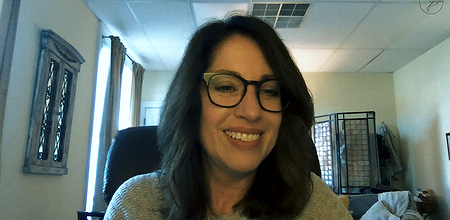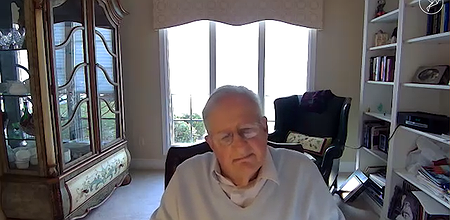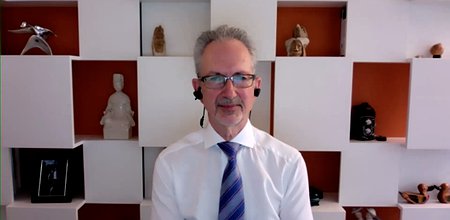This workshop includes theory as well as clinical examples. It includes videos ranging from 5-15 minutes in length. The PowerPoint of the workshop can be downloaded.
Improving the effects of psychotherapy offered through videoconferencing
Prof Stéphane Bouchard, Psychologist
The tools to have an efficient practice in videoconferencing psychotherapy
Excerpt:
- 3h30 of continuing education
- 19 lessons that last from 5 to 15 minutes each
- 1 certificate of achievement
- 1 power-point
- 1 bibliography
- 1 course evaluation
- 4 months access - automatically extended until you complete the course
- 7-day money back guarantee
- 92% of participants who completed the satisfaction survey declare they would recommend this course to a colleague
Overview
This workshop is intended for clinicians who wish to ground their clinical decisions on the most up-to-date research when delivering individual psychotherapy for adults through videoconferencing. In this workshop, Dr. Bouchard discusses the ethical implications of delivering therapy online and explains how clinicians can build a strong alliance with their patient. He also demonstrates the importance of telepresence and presents seven key areas that need to be considered to improve outcome when delivering psychotherapy remotely, including: key empirical findings on the effectiveness of therapy delivered remotely, and its limitations; the ethical and practical implications of various technologies; the importance of both the patient’s and the clinician’s physical environment; strategies that can be used to alleviate the patient’s concerns about distance intervention and remote psychotherapy; strategies to increase therapist self-efficacy; strategies to build a strong therapeutic alliance and to increase the patient’s telepresence; the regulations that should be considered when delivering psychotherapy remotely; and crucial information about when telepsychotherapy is not indicated.
About the expert
![Picture of Stéphane Bouchard [en]](/media/studeo/teachers/2021/Picture_jz2iMmx.jpg.500x500_q85_box-20%2C0%2C321%2C300_crop_detail.jpg)
Dr. Stéphane Bouchard, psychologist, is the Canada Research Chair in Clinical Cyberpsychology and a full professor of clinical psychology at the University of Quebec in Outaouais.
As a scientist-practitioner, he has dedicated his career to developing clinically useful models and interventions and to conducting rigorous studies on the treatment of anxiety disorders and other mental disorders. His research focuses on the development of virtual reality environments to treat complex anxiety disorders as well as pathological gambling. He also conducts clinical trials on the effectiveness of in-virtuo exposure for anxiety disorders, as well as experimental studies to understand what makes virtual reality an effective therapeutic tool.
In addition to this, Prof. Bouchard researches the clinical effects of telepsychotherapy (distance intervention) and how this intervention should be used to obtain optimal treatment outcomes. He has received several awards and distinctions, including the prestigious Adrien Pinard Prize for his significant contributions to the field of psychology.
Learning objectives
- Review the research findings that clinicians should know in order to make informed clinical decisions
- Enable clinicians to build a strong alliance when using videoconferencing to deliver psychotherapy
- Understand the ethical implications of videoconference psychotherapy and the limitations of such interventions
- Understand the importance of telepresence when delivering psychotherapy via videoconferencing
Learning material
Syllabus
- PowerPoint
- 1. Presentation
-
Telepresence
- 2. The basics of telepresence and improving Visioconference psychotherapy (VCP)
- 3. VCP in relation with panic disorder
- 4. VCP in relation to general anxiety disorder and post traumatic stress disorder
- 5. VCP in relation to major depression, eating disorders, and a summary of the published data
-
Questions related to effectiveness and conclusive data
- 6. Limitations of studies and knowledge on VCP
-
Technology challenges
- 7. VCP and technological challenges
- 8. Good habits to take regarding technology
-
Challenges related to the physical environment
- 9. VCP and the challenges related to physical environment
- 10. Habits and strategies to best handle technology
-
Techno-anxiety of clients and professionals: reducing clients’ and professionals’ apprehensions
- 11. Techo-anxiety and the relationship between the professional and VCP
-
Self-efficacy of professionals
- Issues related to the therapeutic alliance
- 12. VCP and therapeutic alliance
- 13. Studies on VCP and therapeutic alliance
- 14. Meta-analysis of the relationship between VCP and therapeutic alliance
- 15. Practical advice to build a strong therapeutic alliance with VCP
- 16. Healthy habits in relation to VCP
- Legislative issues
- 17. The legal issues of VCP
- 18. Contraindications in relation to VCP
-
Conclusion
- 19. Conclusion
- Bibliography
CE Credits
Download a certificate of successful completion.
Audience
This training is intended for mental health professionals.
Registration
Ask a question
Do you have a question? Then email us at contact@asadis.net
Frequently asked questions
-
How long do I have access to the course?
After your registration, the course is accessible anytime and from anywhere for 124 days. And if that’s not enough, we’ll automatically extend your access.
-
When does the course start?
That is entirely up to you! When you buy a course, you'll receive an access link that you can activate when you want.
-
Is there a student rate?
Yes there is! To learn more, email us at contact@asadis.net.
You may also be interested in:
Legal notice
The courses offered by ASADIS are accredited by different professional organisations. In addition, ASADIS is approved by the Canadian Psychological Association to offer continuing education for psychologists. ASADIS maintains responsibility for the program.
The CPA’s approval of an individual, group, or organization as a CE Sponsor or Provider is restricted to the activities described in the approved application or annual report form. The CPA’s approval does not extend to any other CE activity the Sponsor or Provider might offer. In granting its approval, the CPA assumes no legal or financial obligations to Sponsors, Providers, or to those individuals who might participate in a Sponsor or Provider’s CE activities or programs. Further, responsibility for the content, provision, and delivery of any CE activity approved by the CPA remains that of the CE Sponsor or Provider. The CPA disclaims all legal liability associated with the content, provision, and delivery of the approved CE activity.





